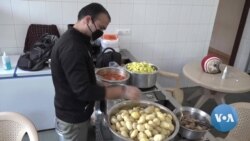Inside a kitchen in a housing complex in Gurugram near the capital New Delhi, cooks mash potatoes, season vegetables and fry an Indian bread called “puri” to prepare about 100 meals every day for families whose money has run out. The rations are bought with contributions from residents for whom this kitchen usually makes food.
Supervisor Rahul Rawat makes sure it is a satisfying meal. “We make spicy food so that those who eat it find it tasty.”
Just a few kilometers away a couple who run a commercial kitchen that caters Asian food have spearheaded another community initiative that has grown rapidly.
They began by preparing about 200 meals a day of rice and lentils in their kitchen facilities but as word spread, friends and others pitched in – some supplying dry rations, others volunteering to help. That marked the start of the “Janta Rasoi” or “People’s kitchen” that now provides about 2,500 meals every day.
“We see a lot of men who would have been working but they don’t have any means so now they are standing there. We keep getting calls – urgent calls,” says Arjun Pandey, co founder of Janta Rasoi. “Today we got a call from 14 day wagers who were stuck and had not had food for two days.”
That is not surprising. Tens of thousands came from villages over the last two decades to the business hub of Gurugram to work as security guards, drivers domestic helpers and other support staff for high earning corporate executives and businessmen.
They lived in tiny shanty homes that sprouted in the shadow of glitzy office buildings and gated apartment complexes in the city.
But since India imposed the world’s largest lockdown nearly a month ago to contain the coronavirus pandemic, these migrant workers have been stranded without jobs – a plight shared by millions across Indian cities. Their meager savings have quickly depleted, raising the specter of hunger.
State authorities across India are running kitchens and shelter homes for the poor and the government has said it will give additional food rations. But confined to their tiny homes in city slums, many people cannot access such benefits or reach out for help in a shuttered country.
Social welfare organizations also point out that many will be left out of such safety nets simply because the scale of the problem is so huge -- there are some 120 million migrant workers in the country.
Charities that run helplines for migrant workers say pleas for food have been growing.
For Zorawar Kalra, who runs fine dining restaurants in several cities, the decision to use his facilities to prepare meals for the hungry came when he saw a stream of migrant labor trudging back to their villages when he was out to buy medicines.
Tens of thousands of workers fled cities worried about how they would sustain themselves without money – many had to walk home as public transport was suspended.
“These people have no money to eat. They have no jobs. They have no way to feed their children,” says Kalra, Managing Director of Massive Restaurants. “I don’t think it can be a worse off situation for a human being than that scenario. That really touched the core.”
His restaurants prepare about 5000 meals a day. “Our job in the restaurant industry is to feed people so this is what we do and it only makes sense, logical sense, for us to open up our kitchens and our resources and our hearts,” he says.
Kalra is not the only one – several other restaurants in the country have also pitched in.
The Jan Sahas Social Development society, a voluntary group, which initiated a helpline for stranded workers says the biggest upside during the lockdown has been the huge numbers of the more affluent that have stepped forward to help. “In the last 20 years that we are working, this is the first time that we have been contacted by so many people who want to support stranded families,” according to Ashif Shaikh of Jan Sahas. Just yesterday we got a call from a residents organization that had prepared ration kits for 300 families in New Delhi and went with us to distribute it.”
It will be critical to sustain such community initiatives to ensure that the poor do not go hungry as the struggle to find jobs will not end anytime soon amid a battered economy.
People like Pandey are hopeful that the momentum will be maintained. He points to how he was able to scale up due to generous contributions. “This became a true community initiative and I think that is the biggest take away for me,” he says. “One of the reasons that empowers me is every day when I go out to distribute these meals is the number of volunteers, how society is standing together, all of us have united as one to fight this pandemic.”






